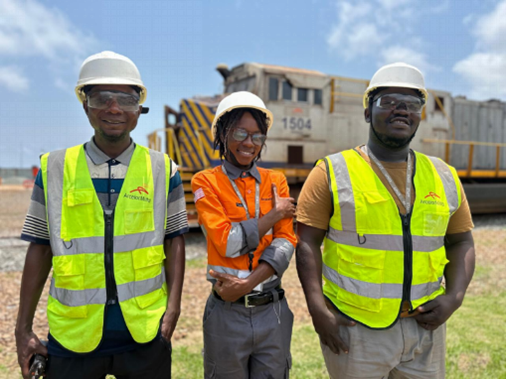ArcelorMittal Liberia (AML) has embarked on a significant youth empowerment initiative, providing employment and skills development opportunities to young people from communities bordering its operations in Bong, Nimba, and Grand Bassa Counties. This program focuses on training a new generation of Train Assistants, equipping them with the necessary skills and experience to contribute to Liberia’s rail transport sector. The program represents a substantial investment in human capital, fostering local talent and providing sustainable career pathways for youth in these communities. This latest cohort of 21 trainees, including two women, signifies a tangible commitment to diversity and inclusivity within the program. The rigorous training program underscores AML’s dedication to equipping its workforce with the highest standards of professionalism and expertise.
The training program consists of two phases: a four-week theoretical training module and a 12-week practical training period. The initial theoretical component, held at AML’s Training Academy annex in Buchanan, immerses the trainees in fundamental rail operations, including General Operating Instructions, ArcelorMittal Rail Operational Rules, the specific responsibilities of a Train Assistant, intricate air brake systems, and crucial shunting procedures. This foundational knowledge provides the trainees with a comprehensive understanding of the principles governing safe and efficient rail operations, laying the groundwork for their practical application in the field.
The subsequent 12-week practical phase translates classroom knowledge into real-world expertise. The first eight weeks are spent in the Buchanan rail yard, where trainees gain hands-on experience under the mentorship of seasoned Senior Train Assistants, Train Drivers, and Yard Supervisors. This immersive environment allows trainees to develop their skills in various essential tasks, including shunting techniques, track switching, the coupling and uncoupling of wagons, managing air hoses, identifying defective wagons, unloading wagons at the port, and the complex process of marshaling trains for departure. This rigorous on-the-job training ensures that they develop a strong practical aptitude and the ability to handle real-world situations effectively.
Following their yard training, the trainees embark on the mainline, traversing the 240 kilometers from Buchanan to Tokadeh yard. This final stage of practical training exposes them to the challenges and complexities of mainline operations. They gain experience in navigating train crossings, loading procedures, shunting operations at Tokadeh yard, and direct communication with train dispatchers, crucial for maintaining safe and efficient rail traffic. This comprehensive exposure to all aspects of train operations prepares them for the demanding responsibilities of their future roles. Upon successful completion of the program, trainees undergo a comprehensive assessment and are certified as qualified Train Assistants.
The cyclical nature of the program allows for continuous training and development within the community. Upon graduation of the current cohort, an additional 24 trainees from fence-line communities are scheduled to begin the program. This ongoing commitment to training ensures a steady pipeline of skilled Train Assistants, contributing to the sustainability of Liberia’s rail transport sector. The continuous intake of trainees from local communities reinforces AML’s commitment to providing opportunities for local youth and creating a positive impact on the surrounding communities. This approach promotes local employment and strengthens the company’s relationship with its neighboring populations.
The program has already transformed lives, providing meaningful employment and financial stability for young individuals from these communities. For many trainees, this opportunity marks a significant turning point, opening doors to a more secure future. Loretta Dolo, from Zoweinta in Bong County, exemplifies the transformative impact of this initiative. Her journey from a motorcycle repairer with limited income to a fully employed Train Assistant underscores the program’s power to empower individuals and improve their livelihoods. Similarly, Samuel A. Weedee, from Compound Three in Grand Bassa County, expressed his gratitude for the opportunity to work for AML, acknowledging the positive impact on his family and community. These personal stories highlight the program’s significant role in creating positive change and building a brighter future for the participating youth.
This investment in youth empowerment and skills development reflects AML’s commitment to sustainable community development. By providing training and employment opportunities, AML contributes to the economic growth and social well-being of the communities surrounding its operations. The program also strengthens Liberia’s rail transport sector, a vital component of the country’s infrastructure. By investing in human capital, AML is not only building a skilled workforce but also contributing to the overall development and progress of Liberia. The ripple effect of this initiative extends beyond individual beneficiaries, positively impacting families, communities, and the national economy. This commitment to capacity building and sustainable career development strengthens AML’s standing as a responsible corporate citizen, invested in the long-term prosperity of Liberia.














